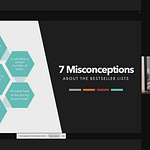Writers talk endlessly about persistence, motivation, and mindset. But as strategy consultant and debut author Kyle Austin Young argues in his new book Success Is a Numbers Game, effort alone doesn’t decide outcomes—strategy does.
In our recent Author Insider AMA, Kyle shared how to think more intelligently about success: how to identify the factors that truly shape it, improve the ones you can control, and accept the ones you can’t. His advice is pragmatic but encouraging, a blend of data and empathy that’s tailor-made for creative professionals trying to make something that lasts.
Below are nine lessons from our conversation—practical, applicable, and a little sobering (in a good way!)
(Note: some quotes have been lightly edited for clarity and concision.)
1. You Can’t Control Luck—but You Can Design for It
“It’s not enough to do the work you’re assigned. You have to increase the odds that the whole project succeeds.”
“Create what I call a success diagram. Graph out everything that has to go right in order for you to accomplish a goal.”
Early in his career, Kyle learned that hard work doesn’t automatically pay off. After being laid off twice, he realized that “doing a good job” wasn’t the same as ensuring the project itself succeeded. That realization became the seed of his approach to creative and business goals alike: identify what has to go right, list what could go wrong, and improve each variable you can control.
Writers can use this same principle to manage the life of a book. Map out each stage, from idea to publication to promotion, and identify where the real risks lie. Once you see them clearly, you can make small, targeted moves that tilt the odds in your favor. It’s not pessimism; it’s design.
2. Prolific Beats Perfect
“Mozart composed over six hundred pieces. Van Gogh averaged a new work of art every thirty-six hours.”
Kyle points out that even geniuses played the odds. Their greatness wasn’t just inspiration—it was iteration.
Mozart wrote hundreds of compositions. Beethoven created 722 works over a 45-year period (his earliest work was composed in 1782, when he was only twelve years old). And Picasso famously created over 50,000 works of art in his lifetime.
For writers, the takeaway is simple: quantity breeds quality. The more projects you complete, the more chances you create for something to break through. Publishing, like probability, rewards repetition: finishing, learning, and moving on.
3. Nail the Three Big Questions
“You’re the wrong author, you’re writing the wrong book, or this is the wrong time for that book.”
Publishers constantly weigh three questions when considering a submission: Why this author? Why this book? Why now?
Kyle suggests authors do the same.
Why you? Prove you can reach the audience your book serves.
Why this book? Offer a familiar promise but a fresh angle.
Why now? Time the release to a moment of heightened relevance.
He practices what he preaches. His own book launched in mid-November, strategically timed to ride the wave of year-end reflection and New Year goal-setting. As he put it, “Publishing is a timing business, whether we admit it or not.”









